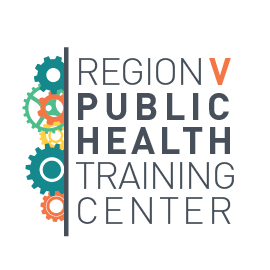By Serena A. McCovery, MBA, National Network of Public Health Institutes
Picture this: a setting where students engage in immersive experiences, cultivating expertise while establishing vital connections. But where and when does this transformative journey unfold? The Region V Public Health Training Center (RVPHTC) has supported such student experiences across IL, IN, MI, MN, OH, and WI for years with stipends and professional development. Field placements and faculty-led collaborative projects within the region’s five-state ecosystem present a dynamic platform for developing skills, forging connections, and charting the course toward transitioning into a professional career.
Field placements and collaborative projects allow students to immerse themselves in real-world public health scenarios. These experiences step beyond the walls of academia while leaning heavily on their theories and preparation; they unfold in diverse settings, ranging from community health centers to expand their initiatives, ensuring a holistic understanding of the challenges and opportunities to impact communities in Minnesota, Wisconsin, Illinois, Indian, Michigan, and Ohio.
The RVPHTC plays an active role in building a more capable and resilient public health workforce by investing in student stipends. This program exposes students to many public health opportunities and eases their financial burdens with the stipend. For public health organizations, it’s an opportunity to harness students’ potential without worrying about financial constraints. Through this experience, students develop skills and build connections with the communities they impact, coworkers, mentors, and supervisors they meet. But it doesn’t end there. These experiences extend beyond mere skill acquisition; they serve as catalysts for personal and professional growth, equipping students with the tools to navigate the ever-evolving landscape of their chosen field. This collaboration paves the way for enhanced community health and a stronger public health workforce.
Student Experience: Developing Skills and Establishing Connections
When asked about her internship, Emma Johnson provided valuable insights into how her time at PrimaryOne Health in Columbus, Ohio shaped her skills and perspective. Johnson’s internship at a federally qualified healthcare facility focused on serving people experiencing housing insecurity. She stressed the importance of meeting patients where they are, which she learned firsthand during her internship.
Johnson’s experience included three main components:
- Online research and resource connection
- Volunteering at a Food Market
- Visiting homeless camps
Through these experiences, she gained a thorough understanding of the challenges individuals experiencing housing insecurity face and the ability to approach patient care holistically. Johnson expressed how her internship amid the global health emergency allowed her to gain new experience and skills and impacted her approach to working with the community.
She shared, “I think COVID-19 accelerated what we were doing because so many people needed those resources. For me, I feel like my experience was definitely a factor in the cause and effect of the pandemic. I was like, ‘I don’t know anything about housing insecure patients.’ Well, good! You shouldn’t. You should go in there and not know anything; just get the opportunity to work on it.”
Johnson emphasized the importance of stepping outside one’s comfort zone while reflecting on her internship. She encouraged future interns to take on challenging opportunities and gain exposure to new experiences. By doing so, they can gain valuable skills and broaden their professional networks.
Supervisor Experience: Facilitating Student Development
What sets these experiences apart? It’s about more than just ticking off boxes or fulfilling requirements. Instead, it’s about diving into the heart of the matter, addressing pressing issues, and effecting tangible change. Through hands-on engagements and collaborative endeavors, students acquire practical know-how, fine-tune their problem-solving prowess, and cultivate collaboration.
Whether improving public health outcomes, bridging gaps in underserved communities, or addressing social determinants of health, students are thrust into the forefront of meaningful action, poised to make a difference.
Ali Abazeed, Director of the Dearborn Department of Public Health in Michigan and a student internship experience supervisor, emphasized the importance of creating a supportive environment for interns. He emphasized transparency and flexibility, allowing interns to adjust to the workplace and feel empowered to innovate. Within the student experiences at the Dearborn Department of Public Health, “we help people get acclimated to make sure that they’re able to do the work they want to do here.” Abazeed acknowledged the challenges of recent health emergencies but stressed the importance of remote work and psychological safety in fostering skill development.
Building Connections Beyond the Internship
Internships provide valuable experiences, but maintaining connections is critical for future growth and networking. Johnson discussed her approach to staying in touch with peers and supervisors, including using platforms like LinkedIn to stay updated on industry trends and opportunities. Abazeed emphasized the importance of building a supportive network and encouraged interns to seek guidance from colleagues and mentors.
The student experiences provide unique opportunities for skill development and relationship-building. Interns can gain valuable insights and make connections outside their internship by working on hands-on projects or collaborating remotely. Interns can lay the groundwork for a successful career in public health by taking on new challenges and creating a supportive environment. The most compelling aspect of these experiences lies in their transformative potential. Beyond bolstering resumes or easing the job search process, they provide:
- A glimpse into the intricacies of professional life
- Invaluable insights into teamwork dynamics
- Evaluation methodologies
- Exposure to the nuanced art of adaptation
Through a place-based approach tailored to the needs of vulnerable populations, students draw firsthand knowledge, laying the foundations for future endeavors that resonate with purpose and impact. Field Placements and Collaborative Projects within Region V are opportunities and catalysts for growth, innovation, and meaningful change.
To learn more, check out these resources:

